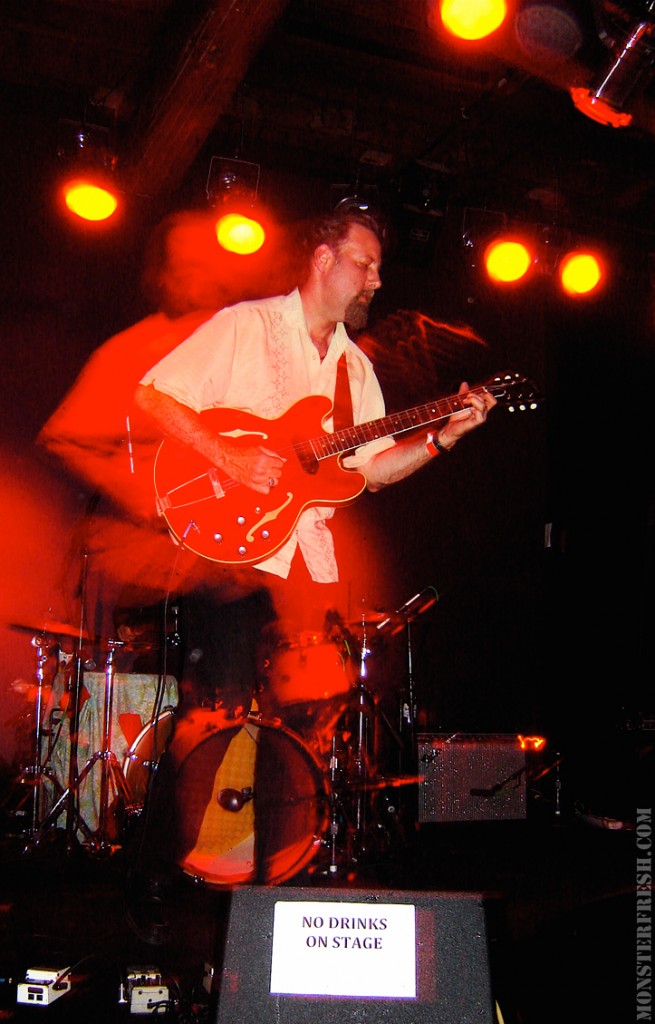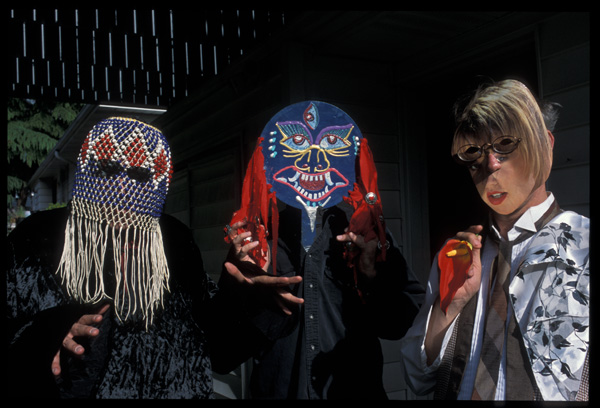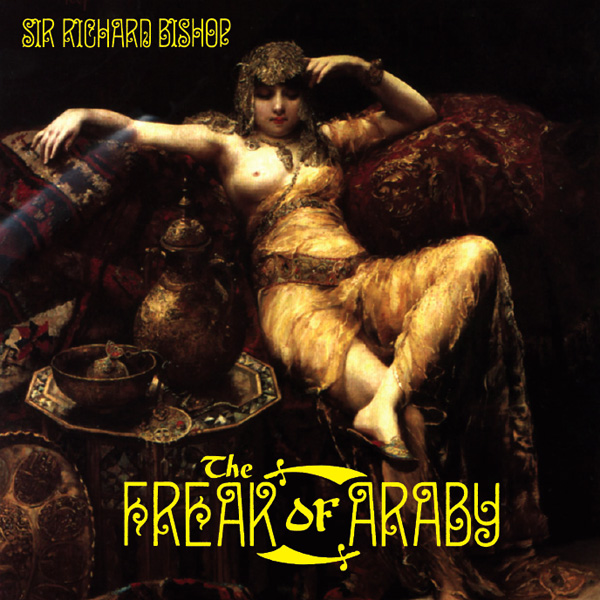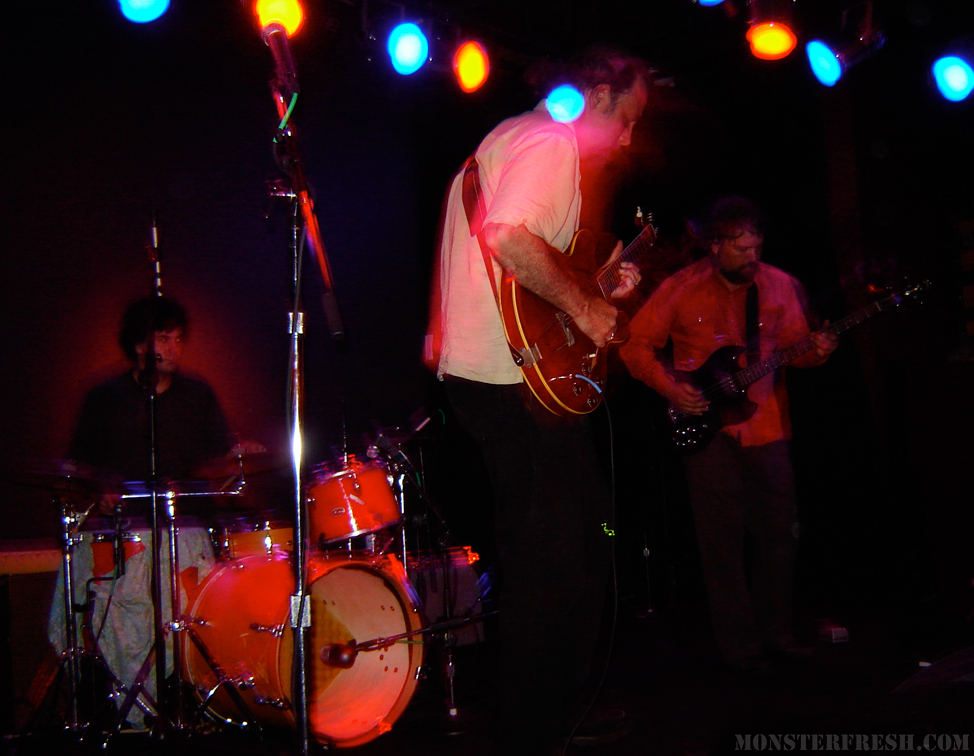The Freak of Araby: Sir Richard Bishop Live in Seattle/Album Review
Sir Richard Bishop and His Freak of Araby Ensemble
July 1st 2009 @ the Crocodile Cafe, Seattle
 On a balmy, early summer evening, legendary guitarist Sir Richard Bishop and his Freak of Araby Ensemble landed in Seattle to play one of the few remaining dates of his latest US tour. Though Bishop is a hometown hero, you couldn’t really call him “local”; Bishop is a lifelong wanderer. In the past two years, he’s dragged his battered acoustic all over Europe opening for Earth, completed a solo tour of Italy and performed with a dance troupe in France. Earlier this year, he even produced his first film, “God Damn Religion“. He still finds time to record and, recently released his sixth solo album Freak of Araby [Drag City]. When he drops the ‘Sir’ from his name, Bishop‘s day job involves dealing antique occult books and international travel; spending much of his time in India and Southeast Asia. Somehow, in the midst of all of this, he must take the time to write new songs, practice with his Ensemble or, for fuck’s sake, relax. It’s the productive guys like him who make me feel bad for sitting around watching Netflix on my computer for three hours every Saturday morning.
On a balmy, early summer evening, legendary guitarist Sir Richard Bishop and his Freak of Araby Ensemble landed in Seattle to play one of the few remaining dates of his latest US tour. Though Bishop is a hometown hero, you couldn’t really call him “local”; Bishop is a lifelong wanderer. In the past two years, he’s dragged his battered acoustic all over Europe opening for Earth, completed a solo tour of Italy and performed with a dance troupe in France. Earlier this year, he even produced his first film, “God Damn Religion“. He still finds time to record and, recently released his sixth solo album Freak of Araby [Drag City]. When he drops the ‘Sir’ from his name, Bishop‘s day job involves dealing antique occult books and international travel; spending much of his time in India and Southeast Asia. Somehow, in the midst of all of this, he must take the time to write new songs, practice with his Ensemble or, for fuck’s sake, relax. It’s the productive guys like him who make me feel bad for sitting around watching Netflix on my computer for three hours every Saturday morning.
Here’s a quick rundown about the life of Rick Bishop. Up until 2007, he’d spent his entire adult life terrorizing the world as a member of enigmatic art-punkers Sun City Girls. The Girls, made up of Rick, his brother Alan and their friend Charles Gocher, sprung from the Phoenix punk scene in the early Eighties. They would open for hardcore acts like JFA and Black Flag, often to the disdain of the audience. SCG‘s bad rep preceeded them and their live shows were often confrontational affairs, with the band hassling the crowd with lengthy improvised noise excursions, wingnut ramblings and the odd Grateful Dead cover. They eventually began releasing music on their Cloaven Cassette series, sending cryptic transmissions out to the die-hards who were already emerging from the scene.
I wasn’t aware of Sun City Girls in the 80s. While they were touring the States, even playing my hometown in ‘86, I was rocking a mullet and listening to Def Leppard. It wasn’t until I picked up a copy of 1994‘s Jacks Creek, the band’s American pioneer-themed radio drama, that I was converted. The record involved the band spitting grizzled backwoods dialect over the sound of a crackling campfire. Though humorous, the atmosphere on Jacks Creek was eerie and depressed. The only “real” music on the album sounded like a marching band, drunkenly, and perhaps even angrily, forcing out off-key, Revolutionary War traditionals. Although I loved the album, I had to ask myself how a band recording that type of material could survive for almost two decades and continue to exist.
The next album that I picked up was the band’s double-disc epic, Dante’s Disneyland Inferno and my mind was duly blown. The album was schizo with stylistic changes, sea shanty rhyme schemes, children’s choruses, lite jazz, conspiracy theory lyrics, and bizarre characters. Plus, it was catchy as HELL. Unlike the music on Jacks Creek, this album was slick, proving that the band could actually play their instruments when they wanted to. I became a convert and began the never ending journey of locating as many of their records as I could. To this day, finding a Sun City Girls LP is the Holy Grail of the record store used bin. When I do find one, I’ll buy it, even if I already own a copy.
As far as most critics are concerned, the band had already peaked with their 1990 release Torch of the Mystics, a polished recording of 11 dusty, Morricone-style instrumentals, steeped in eastern mystical atmospherics. The songs showcased Rick‘s developing technical ability, allowing him to flash the guitar skills he’d been honing since the band’s primordial stage. On Mystics, Rick‘s guitar sounded as if Django Reinhardt had been resurrected through black magic to score a spaghetti western. Albums like this helped add to the band’s growing mystique. For the next 17 years, Rick, Alan and Charles continued to travel the world and melt minds, both live and on wax.

One of my favorite concert experiences was seeing SCG around Christmas time in 2003. The show was at Tacoma, Washington‘s Java Jive, a giant tea cup-shaped structure most notable for it’s appearance in the John Hughes flick Say Anything. The band members crowded onto the cramped stage. Alan was wearing a rubber Saddam Hussein mask and doling out gifts to the audience (mine was a set of orange skull party lights that never worked). After the gift giving, Saddam treated us to a Sun Ra–style free form keyboard introduction. The rest of the band slunk onstage with their faces covered by beaded cloth veils. Rick picked up the guitar and Charles situated himself behind the drums. As Alan removed the mask, the band launched into a faithful rendition of Bloodstone‘s seventies doo-wop hit “Natural High“. Alan was crooning “I’m gonna fly to the skyyy...” while Rick and Charles bopped along, harmonizing the chorus like it was no big thing. After a couple of cuts form Mystics and a hectic, improv rock freakout, that left the band with a total five strings between them, the band took another left turn. They played an insane cover of “Tell Me Something Good“, with Alan shrieking the lyrics ,while Rick held down the song’s ridiculous disco riff in whatever key he could muster. After the show, the band kindly chatted with fans, discussing future plans and new projects on the burner.
In 2004, I saw SCG at Seattle‘s Bumbershoot festival. This time, the trio performed at the Sky Church in Paul Allen‘s EMP. The venue is a ridiculous, overblown theater with million dollar laser lighting and video back drops. The crowd was mostly college kids, leathery baby boomers and kabob-chomping regulars. Onstage, Rick hammered at a slide guitar with a drumstick, sending horrifying feedback bursts into the wincing audience. Alan, wearing an XXXL Osama Bin Laden t-shirt, held a golf club high above his head, swinging it downward to smack practice balls at the festival goers. The wizened Gocher, always dapper in a worn-in suit, shuffled his drums and gurgled unintelligible commentary into the microphone. As the audience became increasingly unnerved, the band continued to taunt. As Alan peeled bananas, he would screamed, “Suck another dick!” before hurling them into the confused crowd. All this was occurring while Paul Allen‘s U2-style laser show bullshit blazed behind them. If you can, try to Imagine the confusion as attendees filed out of the room, wiping banana off of their cargo shorts, and shaking their heads as they searched the program brochure for Liz Phair‘s start time.
Not too long after that show, The Girls‘ chemistry was irretrievably altered when Gocher passed away after a battle with cancer. After completing a tribute to Gocher, with their Brothers Unconnected tour, Rick and Alan broke up the band and moved on to other projects. Alan releases the occasional solo album as “Alvarius B.” and continues to run his  Sublime Frequencies label, specializing in rare music from the Middle East and Southeast Asia. Somewhere in the middle of all this, Rick began touring on his own, showing up at Eagles Halls and opening for metal bands, by sitting alone on a folding chair and staring at his shoes as he tears through improvised acoustic guitar ragas. Rick‘s solo work as Sir Richard Bishop differs from his output with Sun City Girls. For the most part, Sir Richard sticks to unaccompanied acoustic guitar pieces. Some improvisational and some that he’s composed himself, occasionally mixing it up with a piano piece or electronic dirge.
Sublime Frequencies label, specializing in rare music from the Middle East and Southeast Asia. Somewhere in the middle of all this, Rick began touring on his own, showing up at Eagles Halls and opening for metal bands, by sitting alone on a folding chair and staring at his shoes as he tears through improvised acoustic guitar ragas. Rick‘s solo work as Sir Richard Bishop differs from his output with Sun City Girls. For the most part, Sir Richard sticks to unaccompanied acoustic guitar pieces. Some improvisational and some that he’s composed himself, occasionally mixing it up with a piano piece or electronic dirge.
The new album, Freak of Araby, is Rick‘s homage to the late Egyptian guitarist Omar Khorshid, who’s music has influenced Rick and who also shares a similar playing style. Re-electrified, Rick has returned to the semi-hollowbody that he used in Sun City Girls. It is also the first Sir Richard Bishop album to feature other musicians. Rick‘s ensemble provides simple bass and percussion rhythms that flesh out the collection of eastern Khorshid favorites, and Bishop originals. The songs are delivered with respectful restraint, as Bishop stays faithful to Khorshid‘s source material, and avoids entry into the unhinged territory of his former band. Listening to the record is like being transported to a cafe in a desert oasis; hashish haze hanging in the air. This effect is enhanced if you actually have your own hashish, when listening to it.
On the night of the show at the, recently reopened, Crocodile Cafe, Bishop was greeted by friends, family and a crowd of well-wishers. While sitting outside, pre-show, I sipped a High Life and eavesdropped on Alan telling stories about the recently wrapped Sublime Frequencies tour. I cruised the merch table, but I already owned all of the records for sale and the only t-shirt size left was small. Unable to continue paying $5 a cup, I left for awhile, hitting the corner store for a tall boy and drinking it out in the van. Show openers Oaxacan, who are also acting as Rick‘s touring version of the ensemble, may have played during this time, but I have no idea. I headed back inside just in time to see Sir Richard setting up.

Bishop began the set with “Taqasim for Omar” a solo guitar piece written for Khorshid. Soon the Freak of Araby Ensemble, which consisted of a drummer, percussionist and a bassist, launched into a never-ending eastern backbeat. They blended each song into the next, while Bishop‘s elegant playing hovered above the sultry rhythm. The audience happily bobbed their heads and held their PBR cans aloft. I wandered around taking pictures, while sweating out my buzz. From within the recesses of the Crocodile, Alan yelled at his brother to ‘”Get a job!” Throughout the set, Bishop stuck rigidly to the material from his new record. The audience danced and clapped along to “Enti Omri“, a funky Egyptian standard, as Bishop ripped scales up and down the neck with the Ensemble grooving behind him. Even while improvising the Maiden-worthy solos on “Essaouira“, Bishop kept things relatively mellow. He did not seem to use any of the many effects pedals beneath his feet, leaving the vibe of Khorshid‘s songs intact. Hearing the tracks live and amped-out, gave me a new appreciation for the late Egyptian guitarist as well as for Bishop, who seemed to channel Khorshid through his axe.
Sir Richard and the Freak Araby Ensemble played just about every song from the new album, excluding “Blood-Stained Sands“, possibly due to a shortage of woodwinds. Near the end of the fairly short set, Bishop thwacked at his guitar, creating the kind of fierce noise damage he’s capable of slaughtering a room with. For a moment, it seemed that the Ensemble was about to head into dangerous improvisational turf. I wanted them to go there, but to be too loose would destroy the mood and the band ended their set gently. “No encores“, Bishop tells the crowd, “there are parties to attend.” As much as I enjoyed myself, I couldn’t help but miss Saddam Hussein and his crazy keyboard, the golf ball assaults, and the overall weirdness of Sun City Girls. Then again, the fact that Bishop, who could just as easily play “Fleur De Lys” as “Radar Love“, has chosen to master Egyptian traditional music, is probably weird enough.
-J.Brogger